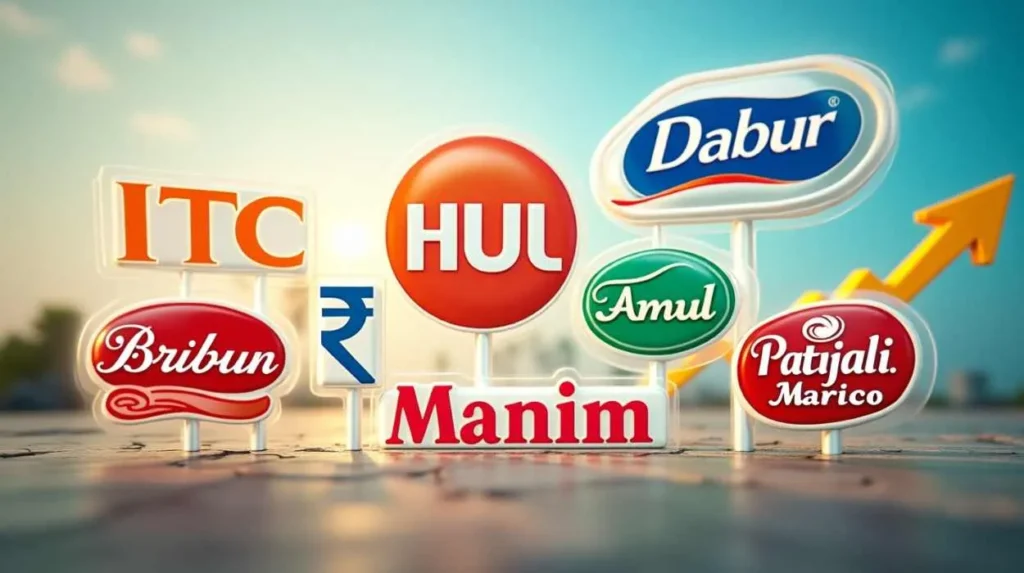The Fast-Moving Consumer Goods (FMCG) industry in India is one of the pillars of the economy of the country as the market giants, such as Hindustan Unilever, have huge market capitalizations. The FMCG Companies in India have transformed the way consumers relate to the daily staples of life such as toothpaste and soaps, packed foods and beverages etc. These firms have constructed large distribution networks that touch all the corners of the country including the busy urban cities and the distant rural communities. The factors that make them successful are their ability to read various consumer preferences, their ability to adapt to the tastes in various regions and their ability to offer affordable services without necessarily compromising quality. The industry has experienced a massive boom owing to increased disposable incomes, urbanization, and the lifestyle variations of the Indian consumers.
What FMCG Means
Fast-Moving Consumer Goods (FMCG) are the types of products that are sold very fast and at a relatively low price being high in turnover and repurchasing frequency. They are the daily necessities that the consumers require on a regular basis and are normally used within days, weeks, and months of being bought. FMCG products have limited shelf life, need broad distribution channels and are retailed across several channels such as supermarkets, convenience stores and kirana stores.
The industry has diverse products that include personal care products such as shampoos and soaps, food and beverages including packaged snacks and dairy products and soft drinks. In this highly competitive environment, FMCG Companies in India are concerned with building their brands, developing consumer loyalty and sustaining competitive prices to dominate the market.
Key Categories: Food & Beverages, Personal Care, Home Care
Food & Beverages:
- Packaged foods, snacks, and ready-to-cook meals
- Dairy products including milk, butter, and cheese
- Beverages like soft drinks, juices, and energy drinks
- Confectionery items including chocolates and candies
- Tea, coffee, and instant food products
Personal Care:
- Skincare products including face wash, moisturizers, and anti-aging creams
- Hair care products like shampoos, conditioners, and hair oils
- Oral care items including toothpaste, mouthwash, and toothbrushes
- Bathing soaps, body wash, and personal hygiene products
- Cosmetics and grooming essentials for men and women
Home Care:
- Laundry detergents, fabric softeners, and stain removers
- Dishwashing liquids and kitchen cleaning products
- Floor cleaners, toilet cleaners, and bathroom care products
- Air fresheners and pest control solutions
- Paper products including tissues and napkins
Market Trends: E-commerce Influence, Sustainable Packaging, Premium and Organic Products
E-commerce Influence:
- Online channels that fuel direct-to-consumer sales On-line channels that stimulate direct-to-consumer sales
- Younger demographics and strategy of digital marketing
- Fast delivery services with real-time delivery
- Regular purchases through subscription Based models
- Brand awareness and purchase decision as an impact of social media
Sustainable Packaging:
- Green substitutes of conventional plastic packaging materials
- Biodegradable and recyclable packages
- The innovative design techniques would help to reduce packaging waste.
- Company promises of carbon-neutral packaging targets
- Environmentally-responsible brands consumers prefer
Premium and Organic Products:
- Rising demand of natural and organic personal care product
- High pricing of quality formulations
- The concerned consumers who use health-related products without chemicals
- Handcrafted and craft products are becoming popular in the market
- International brand alliances that introduce world standards
Market Size, Growth Rate, and Economic Importance
Market Size
- The FMCG market in India is one of the biggest consumer goods markets in the world with an estimated value of more than 110 billion dollars by the year 2024
- The industry contributes about 4 percent to the GDP of India hence a major contributor to the economy of the country.
- The urban markets make up about 60 percent of the total FMCG consumption and the rural market has a massive potential of growth
- Personal care products are the greatest product at 40 percent share, followed by food and beverages at 35 percent and home care products at 25 percent
- Millions of people are directly and indirectly employed in the industry in the production, distribution and retailing sectors
- The regional and local players together with local brands share significant market share with multinational corporations
Growth Rate
- Over the last ten years, the Indian FMCG industry has attained a steady growth rate of 8-12 percent every year
- There is a higher growth rate in the rural market of 15-18 percent as opposed to urban market of 6-8 percent per annum
- E-commerce channels are growing at astronomical rates of 25-30 percent year-over year, changing the paradigm of traditional retailing
- The premium and organic product segments are showing growth rates above 20 percent as the consumer tastes change
- Post-pandemic, categories related to health and wellness have been accelerating, with growth (in different sub-segments) of 15-25 percent
- The expansion of export markets is also going up with Indian FMCG brands getting international recognition and growing at 12-15 percent a year
Economic Importance
- FMCG Companies in India are big employers as they provide lively hoods to more than 3 million people along the value chain.
- The industry is the major agricultural demand, assisting farmers in purchasing raw materials valued in billions of dollars every year
- The FMCG companies make notable contributions in terms of taxation to the government in terms of GST, corporation taxes, and other levies
- The industry spurs the associated industries such as the packaging industry, transport sector, advertisement and building infrastructures in the retail industry.
- The advantage of FMCG foreign direct investment is that it attracts foreign capital which comes along with advanced technology and practices of excellence worldwide.
- The rural growth efforts made by these businesses help develop the infrastructural facilities and skills in the distant regions
Table – Company Overview
| Company Name | Sector |
| Hindustan Unilever Limited (HUL) | Personal Care, Home Care, Foods |
| ITC Limited | Tobacco, FMCG, Hotels, Packaging |
| Nestlé India | Food & Beverages |
| Britannia Industries | Food & Beverages |
| Dabur India | Ayurvedic Products, Personal Care |
| Godrej Consumer Products | Personal Care, Home Care |
| Marico Limited | Personal Care, Health & Wellness |
| Colgate-Palmolive India | Oral Care, Personal Care |
| Procter & Gamble India | Personal Care, Home Care |
| Emami Limited | Ayurvedic Products, Personal Care |
Also Read: How to Start a Food Business
Top 10 FMCG Companies in India
1. Hindustan Unilever Limited (HUL)
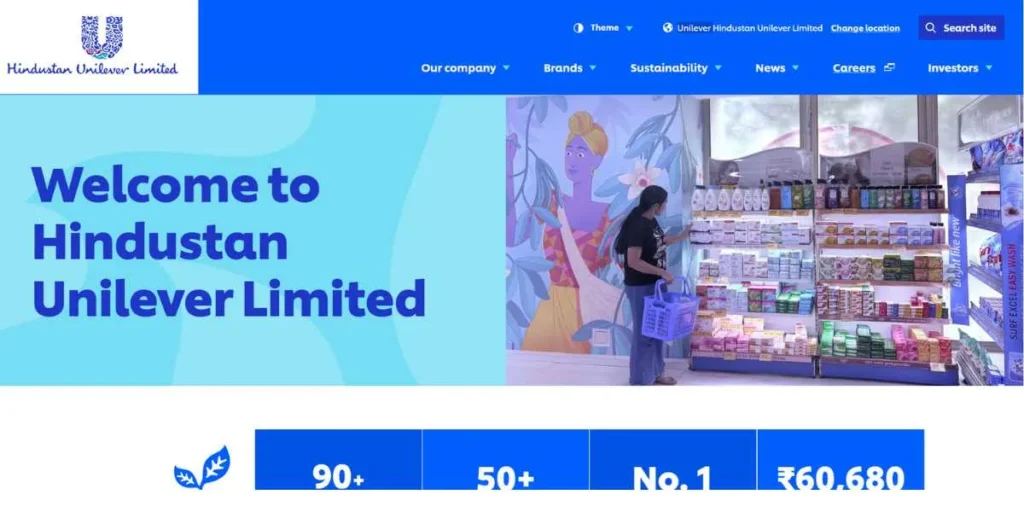
- Founded In: 1933 as Lever Brothers India Ltd
- Founder: William Hesketh Lever (Lever Brothers)
- HQ: Andheri, Mumbai, Maharashtra
- Team Size: Over 18,000 employees
- Sector: Personal Care, Home Care, Foods & Refreshment
- Website: www.hul.co.in
- Address: Hindustan Unilever Limited, Unilever House, B.D. Sawant Marg, Chakala, Andheri (East), Mumbai – 400099
Hindustan Unilever Limited remains the biggest FMCG firm in India with a market capitalization surpassing 5.6 lakh crores, and this is the epitome of consumer goods company. It has established an unrivalled collection of more than 50 iconic brands which have become household names in India. As one of the top FMCG companies in India, HUL has been successful because of its strong knowledge of the Indian consumer, innovation in product development and widespread distribution network of 9 million retail outlets. The firm is also relentless in its pursuit of growth via digital transformation, sustainability, and premiumization trends that meet the changing needs of consumers.
Key Products/Services:
- Personal care: Dove, Lux, Lifebuoy, Fair & Lovely, Lakme
- Home care products: surf excel, rin, wheel, vim, domex
- Foods & refreshments: Knorr, Kissan, Kwality Wall, Brooke Bond, Lipton
- Ayurvedic and wellness: Ayush line of natural products
- Luxury beauty and skin care: Pond s, Vaseline, Simple
What They’re Known For: The most trusted FMCG brand in India with the broadest product line
Market Position & USPs: A market leader with a market share of more than 20 percent across several categories with good penetration in rural markets
Distribution Reach: Has 9 million retail outlets in urban and rural India
Why They Matter: Establishes industry standards and leads the innovation field at the same time being affordable across the economic spectrum.
2. ITC Limited
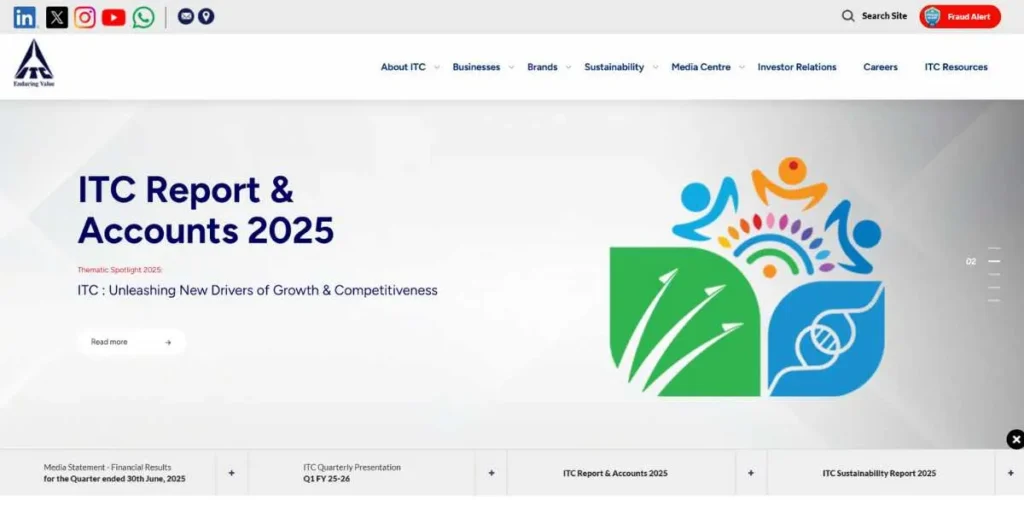
- Founded In: 1910 as Imperial Tobacco Company of India Limited
- Founder: Imperial Tobacco Company (UK)
- HQ: Kolkata, West Bengal
- Team Size: Over 60,000 employees
- Sector: Tobacco, FMCG, Hotels, Packaging, Agribusiness
- Website: www.itcportal.com
- Address: ITC Limited, Virginia House, 37 Jawaharlal Nehru Road, Kolkata – 700071
ITC Limited is one of the most diversified conglomerates that are based in India and were initially set up as a tobacco company but have made it to the FMCG segments as a major player. The firm has been able to expand its operations by branching out to other products such as foods, personal care and home care products. As one of the top 10 FMCG companies in India, the FMCG division of ITC has become a success story expanding exponentially, with the strength of ITC distribution network and ability to build brands. Their interest in natural and organic products is in line with the modern consumer tendencies, and their sustainability efforts have transformed them into a carbon-positive company.
Key Products/Services:
- Food products: Aashirvaad, Sunfeast, Yippee!, Bingo!, Kitchens of India
- Personal care: Vivel, Superia, Fiama, Engage, Savlon
- Home care: Nimwash, Prithvi natural floor cleaner
- Tobacco products: Classic, Gold Flake, Wills (diminishing attention)
- ITC Hotels chain hotel and hospitality services
What They’re Known For: Diverse conglomerate that is heavily in the foods business, and has conducted a successful conversion of tobacco to FMCGs
Market Position & USPs: Third-largest FMCG company, carbon-positive operations and emphasize on natural products
Distribution Reach: More than 6 million retail outlets that have a solid rural and urban presence
Why They Matter: It shows how a company successfully diversified its businesses and still remained a leader in a variety of FMCG categories
3. Nestlé India
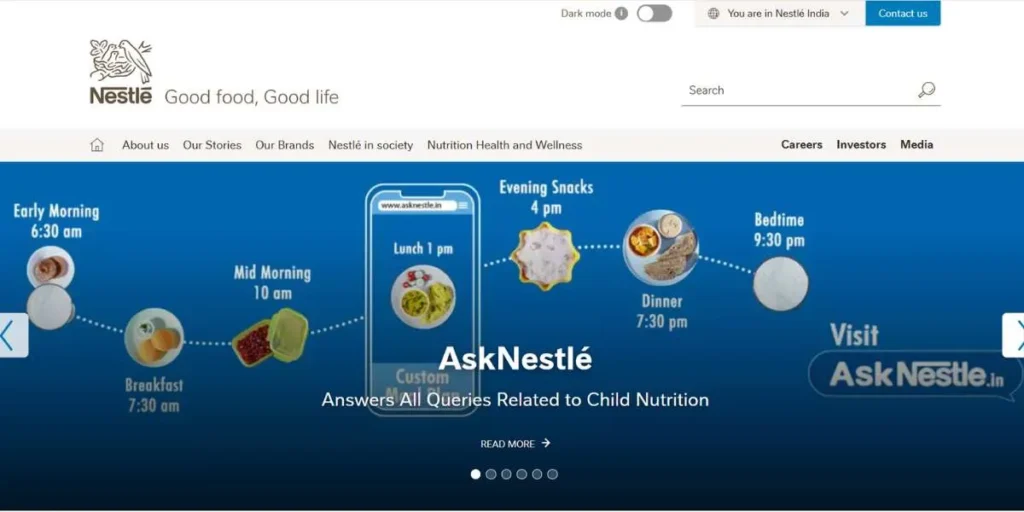
- Founded In: 1866 globally, 1959 in India
- Founder: Henri Nestlé
- HQ: Gurugram, Haryana
- Team Size: Over 8,000 employees
- Sector: Food & Beverages, Nutrition
- Website: www.nestle.in
- Address: Nestlé India Limited, M-5A, Connaught Circus, New Delhi – 110001
Nestle India is the largest nutrition, health, and wellness firm in the country with more than 160 years of international experience in the India market. The company has also developed a solid brand portfolio that has been serving various life stages, including infant nutrition and senior health products. Quality, nutrition and taste can be said to be the main pillars that have earned Nestle the name of a household brand. As one of the top FMCG companies in India, their product development is innovative, and the ability to manufacture locally guarantees affordable and fresh products that appeal to the taste of Indians with respect to international quality standards.
Key Products/Services:
- Instant coffee Nescaf, Nescaf Classic, Nescaf Gold
- Confectionary: KitKat, Munch, Smarties, After Eight
- Noodles and pasta: Maggi noodles, Maggi sauces and seasonings
- Dairy foods: Amul (distribution tie-up), Nestlé Milkmaid
- Infant food: Cerelac, Lactogen, Nan Pro
What They’re Known For: International nutrition know-how and adjusted products, particularly Maggi noodles as well as NescafE
Market Position & USPs: Premium instant noodles & coffee leader focusing on healthy & wellness
Distribution Reach: Available at more than 1.5 million retail stores in India
Why They Matter: Imports global food safety standards and the science of nutrition to Indian consumers
4. Britannia Industries
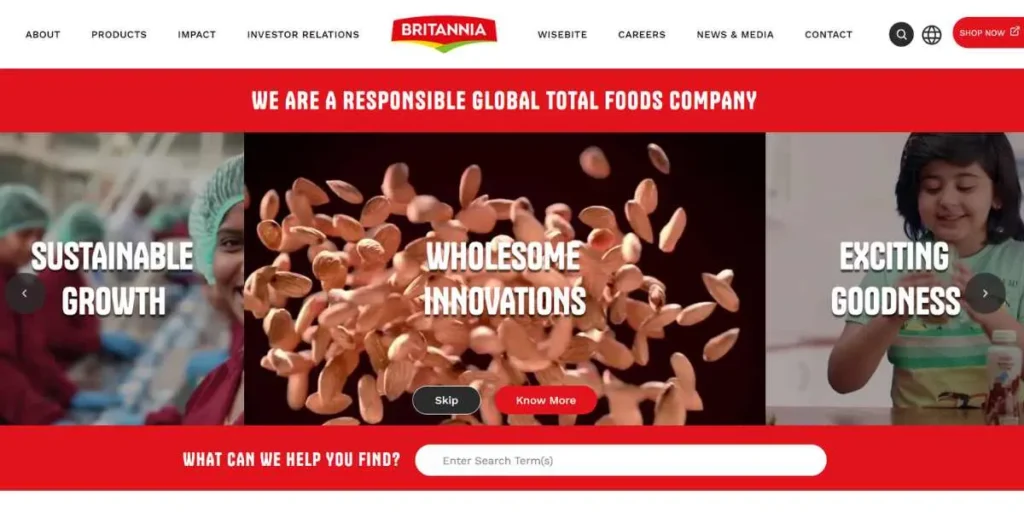
- Founded In: 1892
- Founder: Gurzada Venkata Ratnam Naidu
- HQ: Bengaluru, Karnataka
- Team Size: 5,686 employees
- Sector: Food & Beverages, Bakery Products
- Website: www.britannia.co.in
- Address: Britannia House, P.B. No. 1058, Bengaluru – 560001
Britannia Industries is more than 130 years old as the most popular business firm of biscuits and bakery products in India. The company began as a small bakery and has since been capable of transforming itself into a multi-billion dollar company, however still the company has been able to maintain its values of quality, taste and nutrition. Recognized as one of the top FMCG companies in India, Britannia is also credited with the power to stay ahead of its competition because it is innovative in terms of flavours, packaging and product categories. They have a good brand portfolio that caters to the requirements of the persons at both ends of the age and income scale with high-end cookies to low-end ones of nutrition biscuits.
Key Products/Services:
- Biscuits: Marie gold, tiger, NutriChoice, Bourbon
- Bread and bakery: Britannia Bread, Milk Bikis, Little Hearts
- Cakes and rusks Britannia Cake, Premium Fruit Cake
- Dairy: Butter, milk, cheese, Britannia
- Health and nutrition: Vita Marie, Tiger Glucose, NutriChoice range
What They’re Known For: India most trusted biscuit brand with innovative flavours and packs
Market Position & USPs: 100 percent market share (more than 38 percent) in biscuits category and good brand awareness
Distribution Reach: There are more than 6 million retail outlets in urban and rural markets
Why They Matter: Describes how they bake and millions of Indians enjoy their baked goods and establishes the standards in the bakery business
5. Dabur India
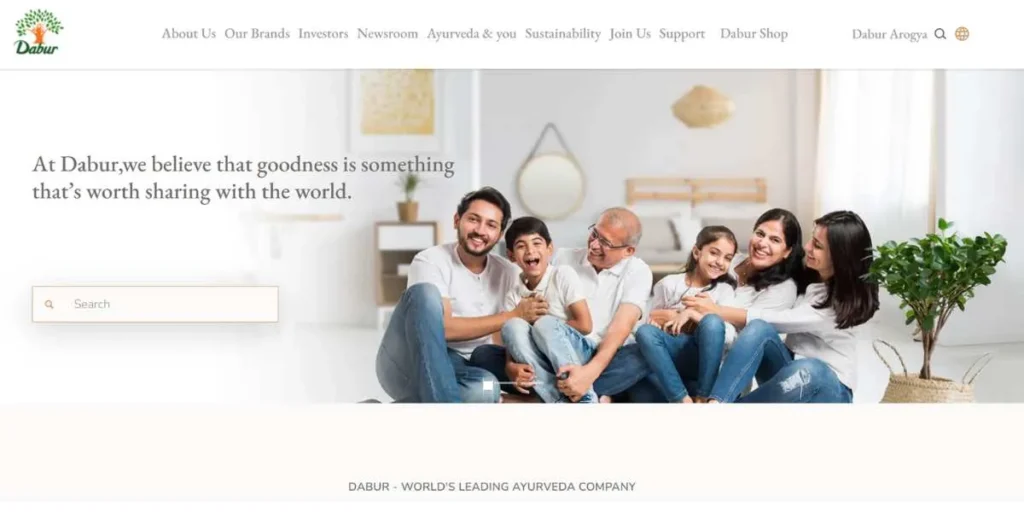
- Founded In: 1884 by S. K. Burman
- Founder: S. K. Burman
- HQ: Ghaziabad, Uttar Pradesh
- Team Size: Over 7,000 employees
- Sector: Ayurvedic products and fast-moving consumer goods
- Website: www.dabur.com
- Address: Dabur India Limited, 8/3 Asaf Ali Road, New Delhi – 110002
Dabur India is an epitome of the traditional Ayurvedic knowledge and modern consumer product manufacturing and therefore is one of the most trusted companies in India as far as health and wellness is concerned. Dabur has a long history of over 140 years in the industry and it has developed a complete range of natural and herbal products which appeal to health-conscious consumers. As one of the top FMCG companies in India, the product quality, authenticity and traditional formulations have made the company trusted by the consumers across generations. The Indian Ayurvedic products have found their way into world markets through the internationalization of Dabur as a company, which has made the brand to be perceived as a global ambassador of Indian traditional medicine.
Key Products/Services:
- Hair care: Dabur Amla Hair Oil, Vatika, Sarson Hair Oil
- Oral healthcare, dabur red paste, Babool toothpaste, Meswak
- Health supplements: Chyawanprash, Honey, digestive products
- Skin care: Nature Care range, Gulabari, Fem
- Food items: Real fruit juices, Hajmola, home pickles
What They’re Known For: The company is the largest Indian Ayurvedic and natural products company with original formulations
Market Position & USPs: Market leader in hair oils and Chyawanprash and 60 percent of the revenue is consumer care business
Distribution Reach: Available in more than 6.2 million retail outlets and are well established globally
Why They Matter: Conserves and contemporary Indian care knowledge and fulfills the modern wellness needs
6. Godrej Consumer Products

- Founded In: 1897, FMCG division established in 2001
- Founder: Ardeshir Godrej
- HQ: Mumbai, Maharashtra
- Team Size: Over 11,000 employees globally
- Sector: Personal Care, Home Care, Hair Color
- Website: www.godrejcp.com
- Address: Godrej Consumer Products Limited, Pirojshanagar, Eastern Express Highway, Vikhroli (East), Mumbai – 400079
Godrej Consumer Products has become one of the fastest growing FMCG companies in India focusing more on personal care and home care products. The company has developed a wide portfolio due to its strategic acquisitions and organic revenues, and holds a good position in hair care, pest control and air care segments. The global expansion strategy of GCPL has contributed to the fact that the company has become a key player in the emerging markets in Asia, Africa, and Latin America. The fact that they are environmentally conscious and their products are natural products works well with other environmentally-conscious consumers.
Key Products/Services:
- Hair care: Godrej Expert, Godrej Professional, hair colors and styling products
- Home care: Good Knight mosquito repellents, hit pest control products
- Personal care: Cinthol soaps, Godrej No.1 soap, Fair glow
- Air care: Godrej aer air fresheners and home fragrances
- Care of fabrics: Ezee liquid detergent of delicate garments
What They’re Known For: The leader in the hair color and pest control segment and the strong international presence
Market Position & USPs: Market leader in hair color (70%+ share), household insecticides and focus on innovation
Distribution Reach: India has more than 3 million retail stores and is present in 30+ countries
Why They Matter: A great showcase of the Indian FMCG brands capabilities of global expansion and category leadership
7. Marico Limited
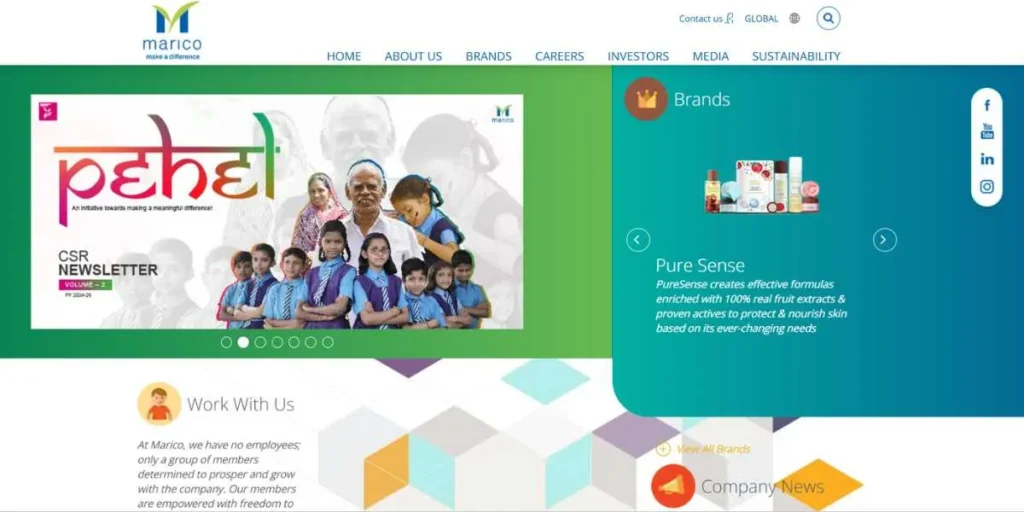
- Founded In: 1990
- Founder: Harsh Mariwala
- HQ: Mumbai, Maharashtra
- Team Size: Over 2,500 employees
- Sector: Personal Care, Health & Wellness
- Website: www.marico.com
- Address: Marico Limited, 7th Floor, Grande Palladium, 175, CST Road, Kalina, Santa Cruz (East), Mumbai – 400098
Marico Limited has become one of the most successful beauty and wellness players to have a focused portfolio of hair care, skin care and health products. The entrepreneur Harsh Mariwala has initiated the firm with powerful brand franchises in the coconut oil, hair care and male grooming segment. As one of the top FMCG companies in India, the presence of international business is also a major contributor of revenues at Marico since it is well established in Bangladesh, Southeast Asia and the Middle East. The creativity of the natural and premium products and excellence in digital marketing have made them attractive to the young categories of consumers.
Key Products/Services:
- Hair care: Parachute coconut oil, Hair & Care, livon hair serum
- Skin care: Parachute Advansed body lotion, Mediker anti-lice treatment
- Male grooming: Set Wet deodorants and styling products, Beardo men
- Health foods: Cooking oils: Saffola cooking oils, oats: Saffola oats, healthy snacks
- Baby Care: Parachute Advansed baby care product
What They’re Known For:The biggest brand of coconut oil and the strong portfolio of male grooming products in India
Market Position & USPs: Leader in the market in coconut oil (59 per cent share) and significant player in male grooming segment
Distribution Reach: Distribution has more than 4.5 million retail units and excellent penetration of rural markets
Why They Matter: First mover in health and wellness positioning among traditional FMCGs
8. Colgate-Palmolive India
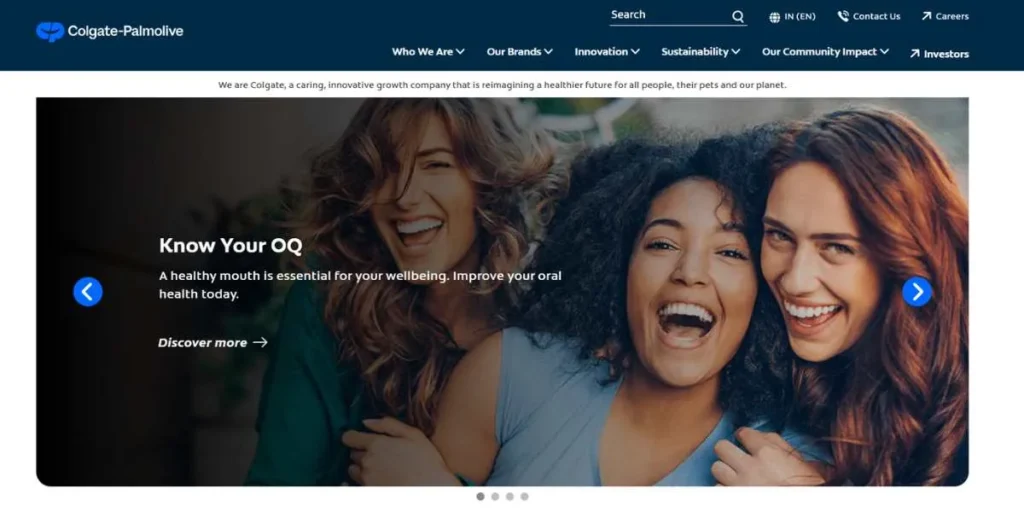
- Founded In: 1937 in India, 1806 globally
- Founder: William Colgate
- HQ: Mumbai, Maharashtra
- Team Size: Over 3,000 employees
- Sector: Oral Care, Personal Care
- Website: www.colgatepalmolive.co.in
- Address: Colgate-Palmolive (India) Limited, Colgate Research Centre, Hiranandani Gardens, Powai, Mumbai – 400076
Colgate-Palmolive India has enjoyed the status of oral care leader in the Indian market going over eighty years in a country where Colgate is synonymous with oral care and dental health. Its additional marketing and community efforts have helped it achieve success in terms of educating the Indian consumers about the significance of oral care. Colgate has maintained itself on track with the different generations concerning the product innovation; the basic toothpaste and the specialized oral care solutions. Their high standards of production and production of products at a desired level have assisted the consumers in developing trust and loyalty in their products. This makes Colgate the most preferred oral care brand in India.
Key Products/Services:
- Colgate Visible white (Toothpaste), Colgate Total, Colgate Strong Teeth
- Toothbrushes: Colgate slim soft, Colgate zigzag tooth brush, Zigzag, electric tooth brush
- Mouthwash: Colgate Vedshakti, Colgate Plax
- Personal care: palmolive body wash/ soaps
- Dental professional products: Dental professional specific dental products
What They’re Known For: It is a household name in India and one of the largest FMCG company in the oral care category
Market Position & USPs: market share in oral care segment 48% + market share in toothpaste category
Distribution Reach: The product is accessible to over 4 million retail locations in addition to the focus on rural education program
Why They Matter: They alone elevated oral hygiene in India to a whole new level due to the consumer education that even continues to date
9. Procter & Gamble India
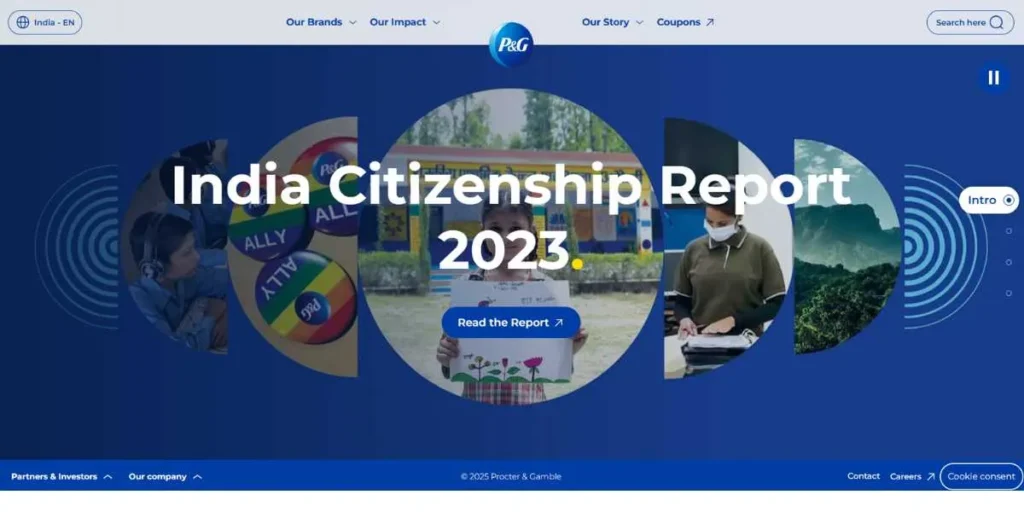
- Founded In: 1964 in India, 1837 globally
- Founder: William Procter and James Gamble
- HQ: Mumbai, Maharashtra
- Team Size: Over 2,800 employees
- Sector: Personal Care, Home Care, Healthcare
- Website: www.pg.com/en_IN
- Address: Procter & Gamble Plaza, Cardinal Gracias Road, Chakala, Andheri East, Mumbai – 400099
Procter & Gamble India is a global company present in India with its premium portfolio of personal care and home care brands/bricks providing global innovation and global quality to Indian consumers. The company has been able to dominate as far as fabric care, feminine hygiene, and baby care are concerned. Combining research and developmental efforts with knowledge of the local preferences has made P&G to have a product that is superior in performance. The consumer loyalty and brand equity have been enhanced due to their strategies of sustainability and social responsibility through different community programs.
Key Products/Services:
- Fabric cleaning: Ariel Powder and liquid washing detergents, Tide Detergent
- Feminine hygiene: Whisper sanitary pad and panty liners
- Baby: Pampers diapers and pampers baby wipes
- Hair care: Head & Shoulders anti dandruff shampoo, Pantene hair care
- Oral care: Electric toothbrushes, Oral-B toothbrushes
What They’re Known For: The high end quality products with innovation taking place around the world exemplifying supreme performance
Market Position & USPs: A leader in the markets of fabric care and feminine hygiene with concentration on premium segments
Distribution Reach: More than 1.5 million retail outlets including a focus on modern trade and e-commerce
Why They Matter: Introduces latest research and development around the globe to act on a particular need of the Indian consumer
10. Emami Limited
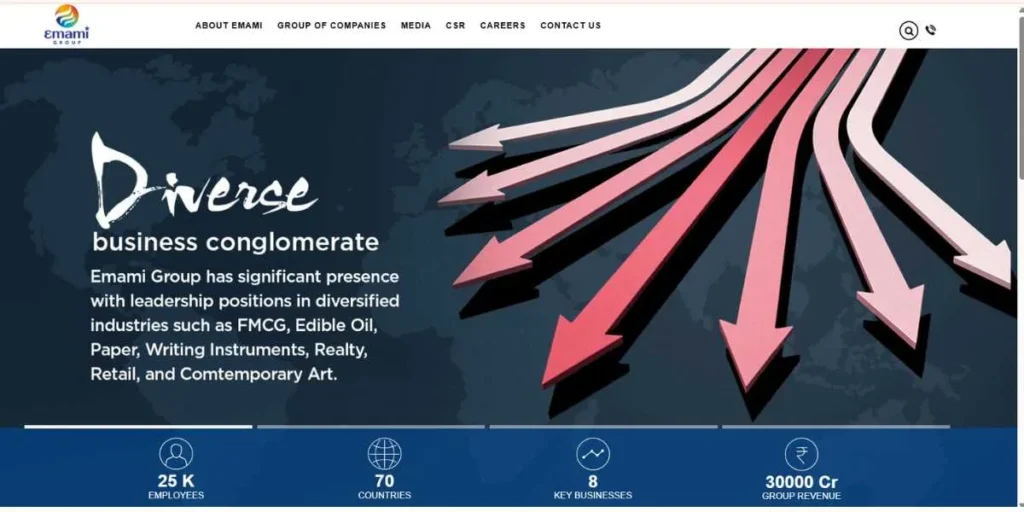
- Founded In: 1974
- Founder: R.S. Agarwal and R.S. Goenka
- HQ: Kolkata, West Bengal
- Team Size: Over 1,400 employees
- Sector: Ayurvedic Products, Personal Care
- Website: www.emamigroup.com
- Address: Emami Limited, 687 Anandapur, E.M. Bypass, Kolkata – 700107
Emami has made its presence in the Indian FMCG market with ayurvedic and natural personal care products which are targeted towards the health sensitive customers. Its new product development and good marketing has made it acquire brand equity in the areas of pain relief, hair care and skin care. Local production capacity and regional expertise have helped Emami to position itself adequately to compete well in regards to prices without compromising on quality of products. The fact that they have recently entered the international markets proves that the Indian ayurvedic products are attractive to the entire world.
Key Products/Services:
- Pain reliever: Zandu Balm, Himani Navratna oil, Fast Relief
- Hair: Kesh King hair oil, 7 Oils in One hair care line
- Skin care: Boroplus antiseptic, Fair and Handsome fairness cream
- Healthcare: Zandu Chyawanprash, wellness and digestive
- Man grooming: HE deodorants and after-shave products
What They’re Known For: Ayurvedic personal care company with a well established local brand
Market Position & USPs: Leader in its market in pain relief balm segment as well as a major player in the male fairness cream segment
Distribution Reach: There are more than 3.5 million retail stores concentrated in eastern and southern India
Why They Matter: Has been in a position to combine the old Indian medicine with new marketing to come up with unique brand positions
Key Challenges in the Indian FMCG Landscape
- In India, the FMCG Companies are surrounded by a lot of competition both in the domestic and international arena and therefore constant innovation and cut-throat marketing strategies are needed to retain market share
- Penetrating the rural market is also difficult because of the lack of proper infrastructure, a complicated distribution system and diverse consumer tastes in different areas
- The volatility in the prices of raw materials directly affects profitability and the firms are forced to strike the balance between cost reduction and quality and low pricing of products
- The disruption of e-commerce is redefining the conventional retailing avenues and necessitating substantial investments in the digital capacities and direct-to-customer approaches
- Regulatory compliance is also made more intricate by the GST, environmental standards, and evolving standards pertaining to packaging needs to be met every now and then
- Environmentally aware customers are exerting sustainability pressures that require heavy investments in sustainability packaging, renewable energy, and responsible sourcing.
Future of FMCG in India
- Digital transformation will be faster as FMCG Companies in India adopt artificial intelligence, data analytics and automation to improve consumer engagement and operational efficiency
- The rural markets hold massive potential, and better infrastructure and increasing incomes are likely to lead to consumption in smaller towns and villages
- Health and wellness trends will be leading product development, and natural, organic and immunity-boosting products will have a considerable market traction
- Individualization and customization will be determinants of differentiation as there will be more use of technology to provide customized products and services to fit consumer preferences
- Sustainability will become no longer nice-to-do, but rather a must-do as circular economy values, carbon-neutrality and plastic-free packaging are becoming industry standard
- Direct-to-consumer channels will grow exponentially due to better logistics, digital payment systems and evolving consumer shopping habits after the pandemic
Conclusion
The FMCG Companies in India are a dynamic and resilient industry that is transforming according to the preferences and the dynamics of the market. All these ten industry giants have proven to be extremely adaptive, innovative and expanding, becoming trusted household names nationwide. Their success stories are indicative of the wider shift in the Indian consumer markets, which have moved away not only in the traditional retail to modern age online shopping, but also in terms of local brands to globalization, and commodity to luxury product offerings.
With the Indian economy expanding and consumer expectations increasing, these companies are in an excellent position to exploit the new opportunities, and at the same time, they have to cope with sustainability and health awareness concerns. Its role in providing employment, GDP and contribution to rural development leaves the sector as one that India cannot do without in terms of economic development.
In the future, it is expected that the FMCG Companies in India will be further spurring innovation, market coverage, and value delivery to the stakeholders as it is expected to adjust to the transforming scenario of consumer goods in the largest democracy in the world.
FAQs
1. Which is the biggest FMCG in India?
Hindustan Unilever Limited (HUL) is the biggest FMCG company in India having a market capitalization of more than 5.6 lakh crores and it is the market leader in various categories like personal care, home care and foods.
2. Which are the key product categories in the Indian FMCG sector?
These are the major segments Personal Care (soaps, shampoos, skincare), Food & Beverages (packaged foods, dairy, soft drinks), Home Care (detergents, cleaners), and Health & Wellness products (supplements, ayurvedic items).
3. What is the effect of e-commerce on Indian FMCG firms?
E-commerce is propelling direct-to-consumer sales, providing an improved data analysis with regards to consumer insights, quick commerce deliveries, and the creation of new marketing opportunities via digital advertising and social media influencers.
4. Which FMCG are ayurvedic and natural products?
The major firms that are specialized in ayurvedic products and natural products are Dabur India and Emami Limited, the natural product range of ITC Limited, and the Himalaya Drug Company.
5. How big can rural FMCG in India grow?
The markets in rural areas are growing at 15-18 percent per year at the expense of urban markets that grow at 6-8 percent annually and are therefore the engines of growth of FMCG companies.
